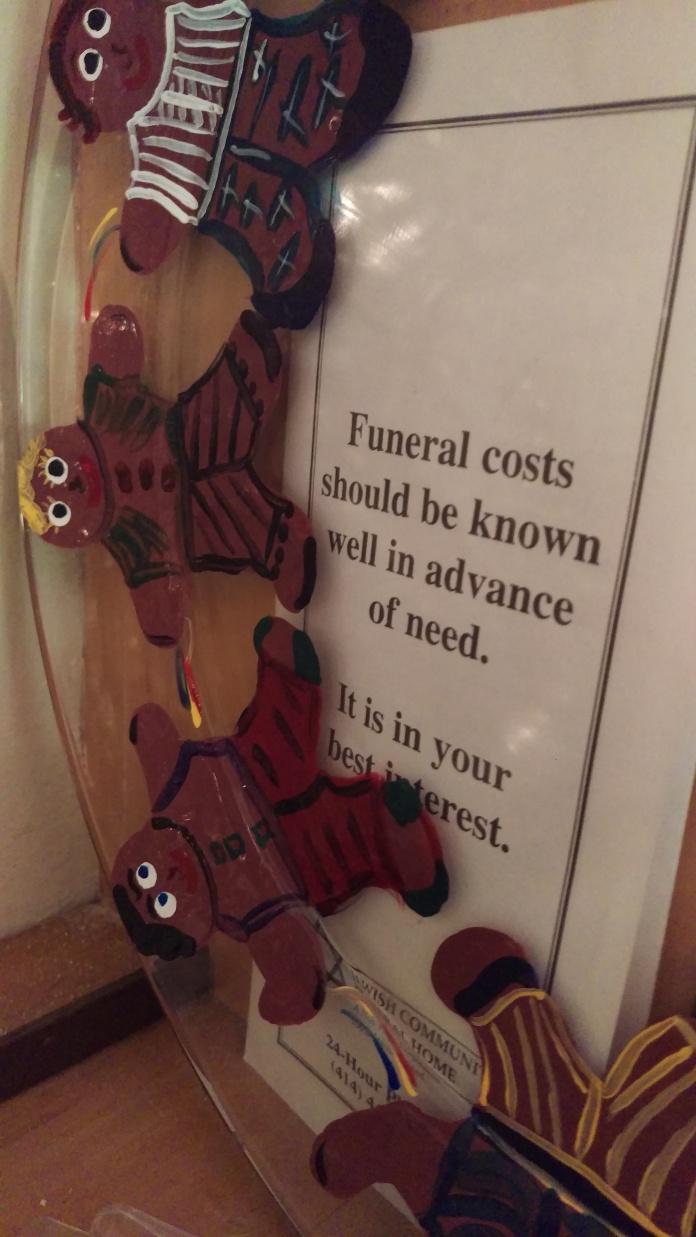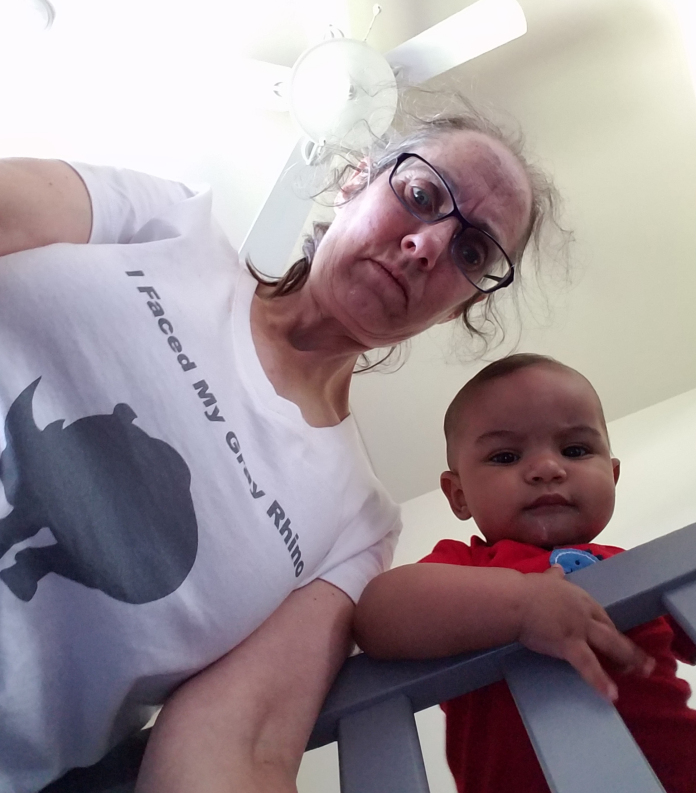When The New York Times recently ran a front page story about China’s effort to combat “gray rhinos” –large and obvious problems that are often ignored until they become crisis– I was beyond excited to see one of my dearest friends getting some well-deserved props.
Then I looked for the citation – because, after all, “The Gray Rhino: How to Recognize and Act on the Obvious Dangers We Ignore” is where the term comes from, and its author, Michele Wucker, is (full disclosure) my closest girlfriend.
The closest the reporter got was this phrase, “an eponymous business book that has become somewhat popular this year in China,” 11 words of a 22-word sentence.
Subsequent stories further twisted the meaning into something that restricted the term to a specific kind of Chinese company. Every time I read one, I wanted to hurl herds of foam rhinos at my monitor, which was problematic because I don’t own any foam rhinos. (On the upside, CNN Money. Bloomberg. South China Morning Post mentioned the book and even spelled her first name – one “l,” not two – right.)
I remember when Michele first started talking about the book, and I remember when she was writing it. I forget a lot of stuff, but I’m pretty sure would have remembered Chinese banking crises if they’d been in mix for inclusion. Greek defaults and the Argentinian financial debacle were. China, not so much. (It would have qualified, but it hadn’t happened yet.)
So, a brief review:
So what’s a gray rhino? In disaster avoidance parlance, to paraphrase the book’s subtitle, a gray rhino is an impending and avoidable threat to which you can respond. They do not have to be big international banking crises. A gray rhino can be as simple as noticing that the sugar canister is down to less than a tablespoon. [bctt tweet=”A gray rhino can be as simple as noticing that the sugar canister is down to less than a tablespoon.” username=”@maveniac”]
I was dealing with one when Michele was working on her book.
‘Woman with with weird resume seeking soft landing’
Ten years ago, something happened at my grant-funded job that made it pretty clear its days were numbered. Ironically, a large component of my job involved helping other people address the fallout from their up-ended lives. I helped them figure out what their best next moves were, then did what I could to see them through those moves. Given that, it would have been pretty hypocritical to pretend I didn’t need to start casting about for my own best chance at a soft landing, which turned out to be enrolling in a library and information science graduate program.
I got laid off the year after I walked across a stage to pick up my master’s degree, spent the following 11 months of non-day-job work applying for day jobs, editing dissertations, writing freelance newspaper and web-based stories and indexing a book. Then, one of those applications panned out and, to my great delight, I landed a job as a public librarian.
Michele loves that story. She keeps asking me to blog about it. But I want to blog about a different gray rhino.
My mom.
Mom has been in a nursing home for almost four years. Before she actually ended up in one, ending up in one was her biggest fear.
Rhino avoided….for awhile
I have vivid memories of nursing home visits to elderly relatives with 50-something Mom. That woman was vibrant. She ran from morning ‘til night. She worked, volunteered, played bridge, was active in her synagogue, a regular at book group and still found time to travel the world with her sisters and host friends at her house on Cape Cod.
We’d walk into a facility and the smell – a melange of stale, damp and vague decay – would hit us. Then, there’d be the sights en route to our destination, usually someone’s room. Near-comatose old people with wispy hair and rheumy eyes sitting in wheelchairs in the halls, or arranged in rows in common rooms in front of a TV. Some would stare at nothing, some were aware of us. Some babbled weird things that were unintelligible or if intelligible, more closely resembled random word strings than coherent thoughts.
We’d find our person and have our visit. On our walk back to the car, Mom would utter a variation of the same declaration.
“If I’m ever like that, shoot me or give me pills.”
I’m pretty sure that 50-year-old Mom would shoot 89-year-old Mom.
Eighty-nine-year-old Mom, however, is not nearly as upset about her current situation.
There are, I think, several reasons for this, many of which involve a veritable herd of Michele-style Gray Rhinos. If Parkinson’s disease had not derailed her well-laid out plans, she’d be living quite contentedly on Cape Cod, using her yearly required withdrawal from her 401K to travel. She’d still be living off her pension and social security checks for daily expenses. Parkinson’s disease was the gray rhino that led us, ultimately, to what Mom – and the rest of us – didn’t think existed.
A good nursing home experience.
After nearly four years, it dawned on me recently that my family is having one. In a very real sense, we were damned lucky to bumble into it. But we also did – and have continued to do – things to maximize the “good” ness of our situation.
How to have a ‘good’ nursing home experience
I could write for days about this, but no one wants to read that much for that long. So I’ll do my best to keep it simple. Here are four tips, two of which I have never seen in any book about nursing homes.
- PR Rollout
- Show up!
- Their casa is your casa
- Plan ahead
Before I elaborate, though, a disclaimer. A lot of what went down in the decade or so preceding Mom’s decision (and it was her decision) to move to a nursing home had reassured her that as far as my sister and I were concerned, she was still in charge. Losing mobility and stamina did not mean losing the right to have her wishes honored while she was still intact enough to make those decisions herself. That still stands now that I am in charge of making decisions on her behalf.

Words to live by. And so benign-seeming when surrounded by painted gingerbread people.
So, without further ado, this, based on our experience, is how to have a great nursing home experience.
Create buzz
If possible, try to build some buzz around your person’s arrival. Think “PR rollout.” We didn’t plan or intend that, but it turned out to be a lucky and very happy accident.
Mom, having made the decision that the nursing home was where she needed to be, opted to blow town and visit her sisters, leaving me to divest of what wouldn’t fit in her new room and choose what would and should. She flew off to California to spend three weeks with her older sisters. (My daughter was headed out there for a conference, so she stopped and picked up Granny on the way; my sister flew from Canada to California, then brought Mom home to her new room.)
I spent the next three weeks cleaning out her apartment, the latter two of them moving things over to her new place, which was in an adjoining building. In the process I got to know the people on her unit. I found out that many of the CNAs had been there for years, a very good sign. They exclaimed over her artwork and listened to my stories about Mom. There was something exotic about her being in California, and the idea that she’d be arriving on a night in the future, like some movie star on tour.
I hadn’t intended the three weeks she was gone to be a buzz-building campaign, but that’s how it worked out. By the time she arrived, everyone was really excited to meet her. Note: I also decorated her room somewhat strategically, placing her United Way ‘Self Above Service’ award and other recognitions she’d received over the course of her life for teaching and synagogue involvement in view of the entrance to her room.
Be present!
I had the luxury of working a mile-and-a-half from Mom for the first two years she was at the Home. But if you can’t be the person who pops in between four and five times weekly (more often even), try to get someone else to do it for you. These don’t have to be extended visits. Sometimes the trip there and back took more time than the quick hello, hug and kiss for Mom and a ‘Hi!’ to other residents and staff people.
Now that I work on the other side of town at a much less flexible job, I’m only there a couple of times a week. But everyone knows why. My sister arranged for her to have a companion two nights a week, so even though I’m not there as often, Mom still gets outside attention.
One of my proudest moments some two years into Mom’s being there occurred when she, more lucid then, reported that on a bathroom run in the middle of the night, the attendants were talking past her (which happens, sadly). One said to the other, “We have to take care of her right away, otherwise she’ll call her daughter.” If you can’t win ‘em over with kindness, making them afraid of you is the next best thing.
By the way, about the staff people: Learn their names. And if you are that kind of person, learn their stories. My sister and I have both worked as reporters. Reporters are curious people who are genuinely interested in other people and their stories. If you’re not built that way, find other ways to be kind to the CNAs and caregivers. Figure out what’s in your comfort zone and show them you appreciate what they’re doing for your person.
Debby and I have ended up making some lovely friends. We also have gotten unofficial calls from staff who’ve let us know when Mom has needed something specific and/or something has happened of which they think we should be aware. To say that we’re grateful doesn’t begin to express our feelings of appreciation and respect for these amazing people.
Don’t treat it like an institution.
You may have to sign in and out and your house probably didn’t have elevators, CNAs and nurses (unless the latter two were your parents and/or siblings) but don’t be shy about treating the place like home. There was the time a new nurse-practitioner was looking for ice and asked a busy staffer. I knew where it was and got it for him. My attitude? Yeah, it’s a nursing home. But my mother lives here. So it’s my mom’s house. [bctt tweet=”Yeah, it’s a nursing home. But my mother lives here. So it’s my mom’s house.” username=”@maveniac”]That goes whether I’m rummaging in the kitchen for cups, straws and tops during an ice water run, fetching a towel or a wheelchair from the storage closets or helping out when dinner’s being served.
Look ahead.
Even though I thought I knew this, I didn’t. I do now because of something I said earlier: “Get to know the staff people.”
I have promised Mom a beautiful, easy death. Which is why, last month, I signed papers with hospice care. Mom gets to stay where she is, and a bunch of new people now come in to see her (social worker, nurse, personal care workers, music therapist).
She’s not at the point where anyone needs to swoop in as what my dear friend Julie (who spent a month in hospice before heading off to the Great Mysterious Beyond Place) referred to as “the pharmaceutical death factory.” But when it does, the hospice people are going to be right there to catch her.
What I didn’t know was that if those papers and that plan isn’t in place and your loved one in a nursing home takes a sudden turn for the worse, the lag time between contacting doctors and pharmacies might well mean that your loved one suffers and dies in pain.
[bctt tweet=”Without a plan in place, your loved one in a nursing home might suffer and die in pain.” username=”@maveniac”].That’s what happened recently to someone on Mom’s unit. The family hadn’t made any arrangements; their loved one did not have the easy death that would otherwise have happened.It tore at the hearts of the staff to watch someone they had come to love and care for suffer when that didn’t have to be the case. [bctt tweet=”It tore at the hearts of the staff to watch someone they had come to love suffer needlessly” username=”@maveniac”].
Originally published at www.thesentencefactory.com. Used by permission.
- The Gray Rhino Moves into a Nursing Home - September 4, 2017


